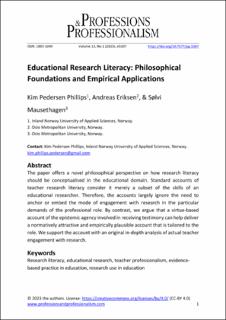| dc.contributor.author | Pedersen Phillips, Kim | |
| dc.contributor.author | Eriksen, Andreas | |
| dc.contributor.author | Mausethagen, Sølvi | |
| dc.date.accessioned | 2023-12-15T10:00:30Z | |
| dc.date.available | 2023-12-15T10:00:30Z | |
| dc.date.created | 2023-12-14T13:02:02Z | |
| dc.date.issued | 2023 | |
| dc.identifier.issn | 1893-1049 | |
| dc.identifier.uri | https://hdl.handle.net/11250/3107735 | |
| dc.description.abstract | The paper offers a novel philosophical perspective on how research literacy
should be conceptualised in the educational domain. Standard accounts of
teacher research literacy consider it merely a subset of the skills of an
educational researcher. Therefore, the accounts largely ignore the need to
anchor or embed the mode of engagement with research in the particular
demands of the professional role. By contrast, we argue that a virtue-based
account of the epistemic agency involved in receiving testimony can help deliver
a normatively attractive and empirically plausible account that is tailored to the
role. We support the account with an original in-depth analysis of actual teacher
engagement with research. | en_US |
| dc.language.iso | eng | en_US |
| dc.rights | Navngivelse 4.0 Internasjonal | * |
| dc.rights.uri | http://creativecommons.org/licenses/by/4.0/deed.no | * |
| dc.title | Educational Research Literacy: Philosophical Foundations and Empirical Applications | en_US |
| dc.type | Peer reviewed | en_US |
| dc.type | Journal article | en_US |
| dc.description.version | publishedVersion | en_US |
| cristin.ispublished | true | |
| cristin.fulltext | original | |
| cristin.qualitycode | 1 | |
| dc.identifier.doi | 10.7577/pp.5307 | |
| dc.identifier.cristin | 2213610 | |
| dc.source.journal | Professions and Professionalism | en_US |

